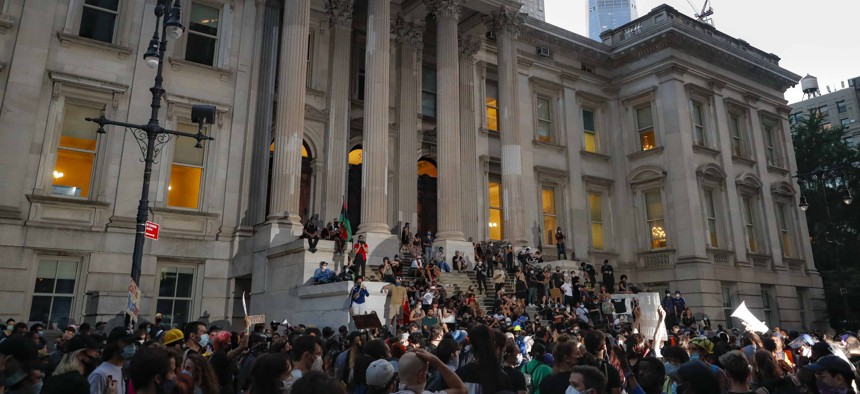Cities' New Unanimity: The Need for Police Reform

Protestors gather outside City Hall in New York City on June 30, 2020 during lawmakers debate over the police budget. AP Photo/John Minchillo

Connecting state and local government leaders
COMMENTARY | In a major turnaround, there's broad agreement and public support in cities across America to change policing.
One of the most surprising aspects of the last few months is how much city leaders, regardless of size or region, have been focused on the same issues at the same time. This is not normal.
Driven almost solely by the Covid-19 pandemic, cities across the country in recent months were dealing with the same key issues—when to lock down, masking policies, how to respond to budget shortfalls and the tricky reopening process. Now, the death of George Floyd in Minneapolis police custody, along with other fatal shootings of Black Americans by police, have once again positioned cities across the country to collectively focus on what public safety and policing should look in the 21st century.
About six months ago, I conducted an analysis of approximately 50 mayors’ state of the city speeches and budget addresses. Public safety wasn’t a significant priority, as only a handful of leaders mentioned it. Interestingly, police-community relations was a top priority for the mayors of both Minneapolis and St. Paul, Minnesota. The sustained protests and discussions around policing mean that the leaders of any city in the country will likely need to join them in making this issue a major focus going forward.
Nevertheless, some of the most impactful and important reforms to policing likely would have to come at the state and federal level. State governments, for example, could revise and strengthen training standards and qualifications for becoming a commissioned police officer. At the federal level, reforms might include limiting the qualified immunity currently given to police officers, establishing stricter national standards for use of force and developing a national database for police misconduct.
These changes may or may not come about, but local governments aren’t waiting. Some municipalities are embracing reform measures developed by the advocacy group Campaign Zero. Called “#8CANTWAIT,” the set of eight harm-reduction policies include banning officers from using chokeholds and firing at moving vehicles, requiring a verbal warning before shooting and making it officers’ duty to intervene when they see a fellow officer violating. While the effectiveness of these policies designed to curb use of force is under debate, cities are also exploring more meaningful actions as well.
In a dramatic turnaround, several cities are considering making drastic cuts to police funding. Maintaining and even increasing police funding has long been a high priority. As mayor of Kansas City, I argued for more funding. And this year Quinton Lucas, the city’s young African American mayor, successfully secured a slight increase despite the looming recession.
But in just a few weeks, all that has changed. “Defunding” police, which most advocates define as a reduction of police responsibilities and transferring responsibilities related to homelessness, drug addiction and mental illness away from law enforcement, has caught on. At least 16 cities, including New York and Los Angeles, have serious plans for cuts in police funding, and in some cases the cuts are not small or symbolic. The speaker and at least seven members of the New York City Council have called for cuts of $1 billion in the department’s $6 billion budget. In Los Angeles, the city council have started to cut the police department budget by up to $150 million, which will be reinvested into supporting Black communities.
Others are saying that, yes, we need to do away entirely with policing as we know it in America today. Something like that is happening in Minneapolis, where the City Council has voted unanimously to replace the police department with a “transformative new model” that will establish a community-led public safety system.
There’s no doubt that major police reform is coming. The combination of broad public support for reform and recorded displays of overly aggressive tactics by police in response to the largely peaceful protests have helped to turn the tide.
Probably more importantly is that Americans are realizing that public safety isn’t just about policing. Kind of like how good health isn’t just about health care. Both the recent protests and the thousands of people dying from Covid-19 and huge racial disparities in hospitalizations and deaths have underscored that safety depends on housing, health care, paid sick leave and a host of other things. A cop on the street with a gun cannot provide all of that that.
Mark Funkhouser, president of Funkhouser & Associates, LLC, is a former publisher of Governing magazine, and mayor of Kansas City, Mo., from 2007 to 2011.

NEXT STORY: Search and Rescue Teams, Already Stretched Thin, See Surge in Calls




